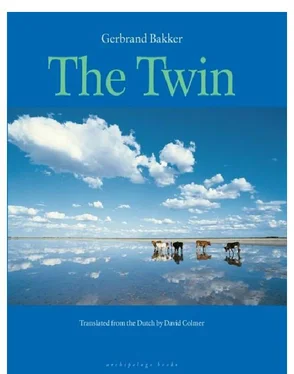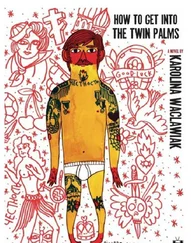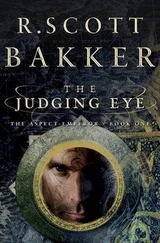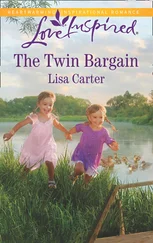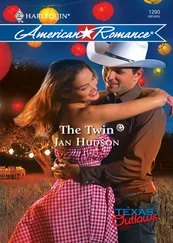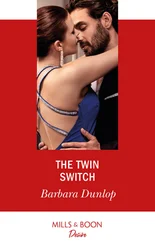Ada wants to take a different route back. We drive through Hem and Blokdijk to Hoorn.
“Let’s go through the Beemster,” she says. “The Beemster is lovely.”
I cut through Berkhout to Avenhoorn and Schemerhoorn. I follow the signs for North Beemster. “The villages?” I ask.
“The villages,” says Ada.
I turn right and take the road through North and Middle Beemster. “Imagine living here,” Ada says. “Just look how much space there is. And the land is so nice and high, ours is always wet. Cramped and wet.”
“Has Jarno Koper gone to Denmark yet?” I ask.
“No, he leaves in January.” She looks around longingly. “Wim would love to have something bigger. Not a lot bigger, just a bit. Ten or so cows, a few hectares.”
“You should go to Denmark too then.”
“God, no. Can you see Wim ever leaving?”
“No,” I say. “I can’t see that happening.” Wim’s lived next door all his life, but I hardly know him.
Just before we turn off to Southeast Beemster, Ada asks me to slow down so she can have a good look at The Unicorn. “Yes,” she says, peering at the renovated farmhouse, “we drive off home, but they’re left behind, without a husband and without a father.”
I stop the car just before the junction and get out. The bare branches of the windbreak bordering the field opposite The Unicorn are damp. I can’t see the end of the row of trees, the trunks blur in the thin mist. A car races past. Then it’s quiet again. On the other side of the junction, standing next to a less beautiful farmhouse, are three horses.
Ada is right, the Beemster is lovely, even in late autumn, but I’m thinking of Denmark. I have the idea that it’s often misty in Denmark.
Ada opens the car door and gets out of the car. “What are you doing?” she asks.
“Nothing special, just standing here,” I say.
She looks at me. “Are you okay?”
“Sure,” I say.
“Funerals are weird.”
“Yeah.”
“Especially when it’s someone you didn’t know very well.”
“Uh-huh.”
“It makes you feel more alive afterwards than you did before.”
“Where does this Galtjo guy live?”
“No idea. I didn’t know that Arie came from as far away as Venhuizen either. What do we know about these people?”
“Not much,” I say.
“Shall we go home?”
“Let’s do that.” I take the middle road to the North Holland Canal, which I follow past Purmerend, Ilpendam and Watergang, until Het Schouw. Then through Broek and home.

Walking into the milking parlor, I hear the phone ringing. I hurry through the scullery to the hall to answer it. Nothing. “Hello?” I say. It stays quiet on the other end of the line, the kind of silence in which you hear someone holding their breath. “Who’s there?” No one responds and I hang up. The newspaper is lying unread on the kitchen table. I can’t sit down. I have to do something. It’s afterwards now: I’m more alive than I was before.
I have a beautiful, small handsaw that is exceptionally well suited to pollarding willows. It’s stayed very sharp for a very long time and must have been expensive. There are willows on the south side and at the back of the farm, and I pollard them every two or three years. I haven’t got round to it yet this year and today is a perfect day for pollarding. Hopefully tomorrow will be too, because I can’t get it all done in just one day. Halfway through the first willow I’m warmed up and when I start on the second I’m already sweating. I don’t need a ladder, a potato crate is high enough. When it’s almost time to start milking, I’ve done the six willows at the side of the farm and have no idea what I’ve been thinking about the whole time. I throw a few shoots in the donkeys’ trough and phone Ada. She has started work on a wooded bank in what is intended to become Waterland’s most beautiful garden. I tell her that she can have my willow shoots if she comes and gets them herself.
Father is standing at the window. That’s not right. He is leaning on the narrow windowsill and his forehead is pressed against the glass. There is a washed-out light in the bedroom, the weather is like yesterday’s: misty with the sun trying vainly to break through.
“How’d you get there?” I ask.
He says something but I can’t understand him.
“What?”
He pushes himself up a little with his arms, straightening his back and pulling his head back from the glass. “The hooded crow’s gone,” he says.
“What?”
“The hooded crow, it flew away.”
Looking past Father through the bedroom window, I now see what I didn’t see through the front kitchen window: the branch of the crooked ash is empty.
“It wasn’t waiting for me.”
“No, of course not, what kind of rubbish is that?”
“That’s what I thought.” His arms start trembling and his head shakes.
“But it would have been wonderful,” I say under my breath.
“What?”
“Walk back to bed,” I say.
“I can’t.”
“Why not? You got to the window, didn’t you?”
Slowly he turns around, keeping his right hand on the windowsill. He looks at his bed like a hesitant long-jumper eyeing the take-off board. Inch by inch he shuffles away from the window. “I’m not going to make it,” he says, halfway.
“Yes, you will,” I say, “don’t give up.”
He doesn’t make it. I’m there to help him. I lift him up and walk around the bed. When I’m about to lay him down, the phone rings. Let it ring. If I answer it, I’ll probably just hear that pent-up silence again. It rings seven times. I lay Father down on his bed.
“I can walk,” he says, still panting.
“You know who died?” I ask.
“No.”
“Arie.”
“Arie who?”
“The tanker driver.”
“No!”
“Yes.”

There is no key in his bedroom door. There isn’t one on the outside of the door to Henk’s bedroom either. I walk in and sit down on his bed. The key is in the keyhole on the inside of the door. I lie down. The curtains are drawn, it’s dark in the room. Staring up at the ceiling I realize that everything would be very different if I had someone, if I was married with children. When you have a family, you can get rid of your father without feeling guilty.
I stand up and pull the key from the keyhole. I go out onto the landing and stick the key into the lock of Father’s door. It fits, but it’s only when I turn it that I feel that it really fits. No remarks from inside the bedroom. I take the key out of the lock and stand there for a moment with it in my hand, then I put it back in the keyhole.
The two bedrooms are on the right side of the landing. Opposite the staircase is a skylight that doesn’t let in much light: upstairs it’s always evening. At the end of the landing on the left, next to the skylight, is a third room, smaller than the two bedrooms. This room covers maybe a third of the milking parlor beneath it. “The new room,” Mother called it to the day she died. I can’t remember what the room was supposed to be for, but ever since it was built along with the milking parlor, some time in the sixties, it has remained unused. I never go in there. The door is always shut. The floor is covered with the same dark-blue carpet as the two bedrooms. It is a very strange room, I feel that when now, for once, I go into it. Although it’s musty, there is also a lingering smell of newness about it, of its being newly built. There is a fairly large Velux window in the sloping wall, making the room a good deal brighter than the landing. But it’s empty, there is no reason to go inside.
Читать дальше
